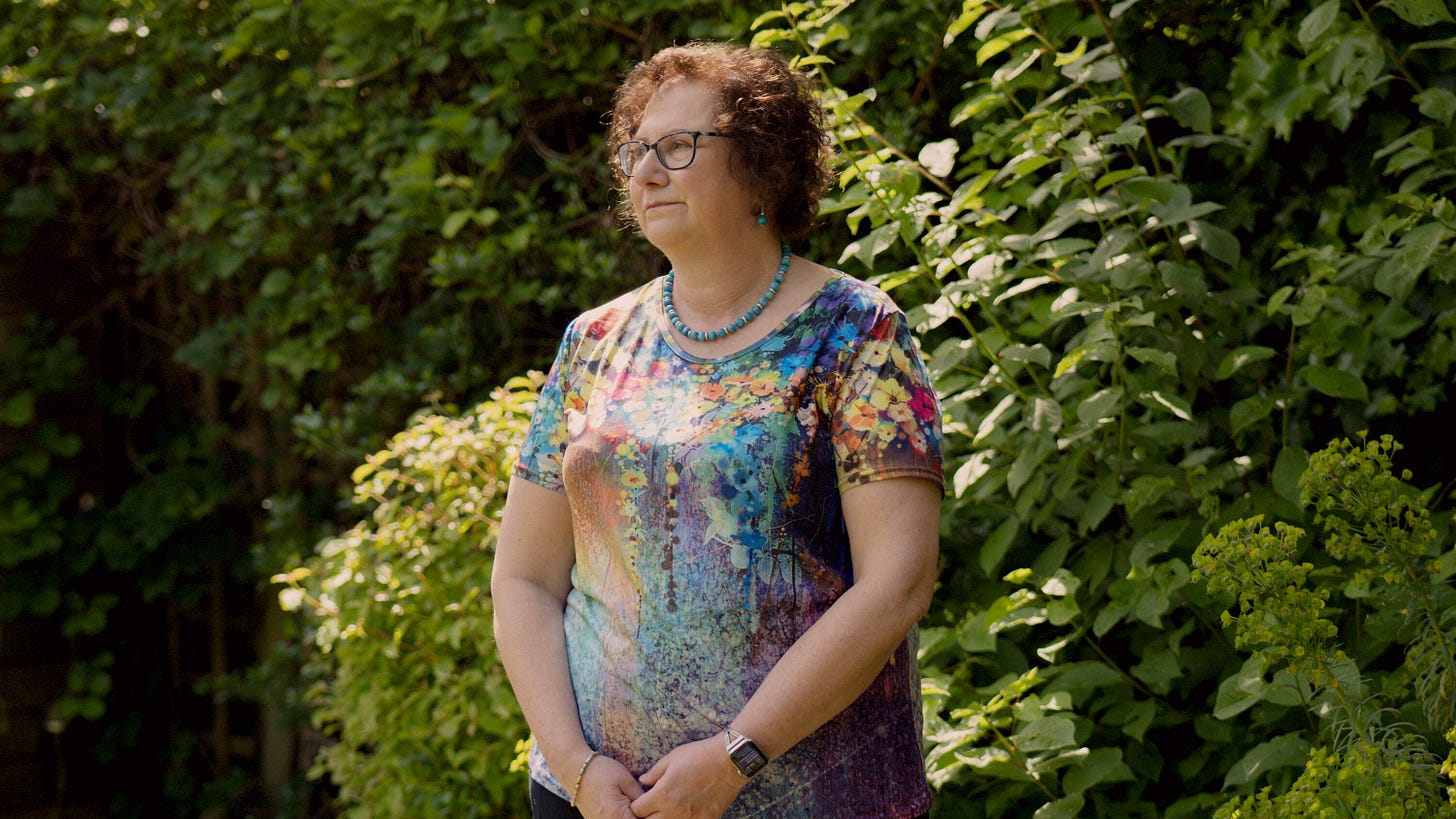Interview with Hillary Cass about her visit to a Dutch trans conference where activists have staged protests
Critics call pediatrician Hilary Cass anti-trans. 'Luckily I know what the truth is'
Pediatrician Hilary Cass had no experience with trans young people until she wrote a damning report on gender care for young people in England. In a few years she has become a much-discussed figure in the debate. She will speak at a conference at the Vrije Universiteit on Thursday 27-06.
English translation of an original interview in Trouw by Susan Wichgers
“Transphobia and misinformation at VU conference,” is the headline of a joint press release from interest groups for trans people. They express 'major concerns' about the conference on Thursday at the Vrije Universiteit on gender care for young people and announce a demonstration.
According to the interest groups, 'notorious anti-trans speakers' are present - including Hilary Cass.
Such accusations are not new to Cass, she says in a video call from her home in London. Over the past four years, she has compiled all research on gender care for young people on behalf of the English health service NHS.
The result appeared in April: a report of hundreds of pages, which prompted England to only prescribe puberty blockers in an experimental setting. Trans young people can still receive them, but they will then automatically participate in scientific research.
The conclusions of her report and its consequences were not well received by everyone. For a few weeks after the report was published, Cass did not travel on public transport due to threats.
Hilary Cass is a pediatrician. She worked in various specialist centers in England with children with autism spectrum disorder, epilepsy and multiple disabilities. In 1992, she opened a national clinic in England for children with Rett syndrome, a rare neurological disorder. She no longer works in clinical practice, but she remains an honorary consultant pediatrician at the Evelina London Children's Hospital.
There she was closely involved in the development of pediatric palliative care. In 2020, Cass was asked by the NHS to produce a report on gender care for young people in England, which she worked on for almost four years.
Have you hesitated about entering such a heated debate?
“Well, I initially started with a small assignment: a review of all published studies on puberty blockers and hormone treatments. It would be two afternoons a month, for six months, done. After that I would enjoy my retirement. But I soon saw that much more was needed. I became very involved and concerned about the young people who are the subject of this report.
“Before I started this I had no experience with trans young people. I started it neutrally, with an open mind. That's what the NHS wanted too: a neutral person who did not work in gender care. Because that field was so polarized.”
Were you able to remain neutral? Some people say you are anti-trans, have ties to Texas politicians.
'That's crazy. That is not true. I've never talked to any American politician. I know there are people who make things up about me. Fortunately, I know what the truth is, so I try to let those kinds of stories pass me by. There are bad actors on both sides of the argument. That helps me maintain that neutrality.
“What does make me angry is the deliberate misinformation people are spreading about the review. For example, what was quickly claimed was that we had ignored 98 percent of the literature. That is not true. We considered all high- and medium-quality studies. Not those of low quality, that would obviously distort the image.
“The team that conducted the review used the method that is standard in England to assess the safety and effectiveness of clinical treatments. I have complete confidence in the methodology. Off the top of my head, they used 28,000 publications and data from 113,000 patients. So that is very extensive.”
Your report is being used as a stick by both sides in the debate. Trans interest groups see their acquired rights being pushed back. The other side uses it to argue that medical care for trans young people goes way too far.
“Yes, that's because it's not black and white. Two things are true at the same time. Namely: for some young people a medical trajectory will ultimately be best. And for some, the gender issue will be a changing thing that will eventually go away without medication. It is not that the medical path is always bad, or good. It is more nuanced.
“The debate on gender care is unprecedentedly polarized. It is somewhat similar to the vaccination debate. People who are critical of this also come up with their own data and research. They are just not as robust as data on the safety of vaccinations. You can always come up with arguments that seem scientifically credible, but are not. All I can do is refer to the diligence and track record of our investigators.”
The Netherlands is the founder of medical care for trans young people, also known as the 'Dutch protocol'. According to that protocol, children with gender dysphoria can be given puberty blockers to stop changes in the body and give them extra time to think. They can then receive gender-affirming hormones. This means that a person will need fewer operations later to pass as the desired gender.
In her report, Cass recommends that, due to the known and unknown side effects and the lack of convincing evidence for a positive effect, puberty blockers should only be prescribed in a scientific setting. This is already happening in the Netherlands: only a limited number of (university) medical centers prescribe puberty blockers and hormone therapy to young people.
How do you think your review translates to the Dutch situation?
“I hope to learn more about the situation in the Netherlands during my visit to Amsterdam. But as far as I understand, Dutch healthcare providers no longer follow the Dutch protocol so closely. In the sense that they also prescribe puberty blockers to young people who will only later struggle with gender dysphoria, not just to the limited group on which the protocol is actually based.
“The protocol is based on a single Dutch study, but when it was carried out, healthcare providers mainly saw born men who had suffered from gender dysphoria since childhood. We now see a different group: mainly born women who only start to struggle with gender dysphoria during puberty. And we have no data on that.
“Suppose a health care provider sees a 15-year-old girl whose puberty is almost over and who is struggling with gender dysphoria, anxiety and depression. What's the best way to help? Is it therapy, puberty blockers, other medications? We simply don't know that now, because no research has been done yet.”
When do we know enough? What research needs to be done?
“We know about puberty blockers that they stop puberty. That's for sure. We know, especially for born men, that it will be more difficult to be seen as a woman later on if they are not given puberty blockers. Their voices become lower, they grow beards.
“What we don't know is whether it is true that puberty blockers give people time to think. Almost everyone continues with hormone therapy afterwards. And we don't know whether it improves mental health. A Dutch study found an improvement, but the same study in England did not.
“It is also uncertain whether puberty blockers have an influence on brain development. During puberty, your brain goes through a lot of changes, for example in the area of executive functions, which influence decision-making and risk assessment. You become better at planning and negotiating.
“We think those functions are partly driven by sex hormones. So what happens if you block it during that period? Will you catch up on that later? If you still get them at sixteen, will you develop in the same way? This has not yet been carefully examined. And we will get answers to these questions sooner than to the questions about positive effects. Research into this will take longer.
“Many young people are now keen on the medical path: they think it will make me better. While sometimes it is better, for example, for a born girl to take the contraceptive pill so that her period does not occur, and to learn to safely wear a binder (a very tight bra that compresses breasts, ed.). I think we need to move much more towards an individual approach.”
Isn't that a sliding scale? Trans young people may not feel taken seriously if the threshold for a medical program becomes too high.
“If I learned anything from the trans young people we spoke to for the review, it's that there are more ways to be trans than in binary medical terms. Some people are gender fluid, gender non-conforming or non-binary. In an ideal world, we would accept everyone, even if someone doesn't adhere to gender stereotypes.
“Now being trans is almost intertwined with medical intervention. A trans woman should look like a perfect woman. We don't expect that from a cis woman. But apart from that, there will always be people who feel uncomfortable in their bodies without medical intervention. It is important that they receive the care they need.”
In England, care for trans young people was very inaccessible for a while due to the closure of the Tavistock clinic, the only NHS clinic in the country. Meanwhile, the waiting list is enormous. What is the situation now?
“Two new regional centers have been opened, one in the north and one in the south of the country. Everyone who was on the waiting list for Tavistock will be transferred there. More centers will open next year. The waiting list will gradually decrease. By the way, I have not decided to close Tavistock, that is up to the NHS and the government. I just said that it is not safe to have one clinic for so many children.
“In the ideal situation, I would like to see young people have good and quick access to care in their area, for all the things going on in their lives. Healthcare providers have become afraid to help gender-challenged youth with other problems. They send all young people who struggle with gender to the gender clinics, and then they end up on that long waiting list. Meanwhile, no one helps them with other problems. For example, no one treats their depression.
“All children across the country should receive the same quality of care, so there should be a national protocol. And if healthcare providers believe that a young person would benefit from puberty blockers, they should be given them, but under scientific supervision. It should not be standard clinical practice.”
What do you think of the criticism that it would be unethical to oblige trans young people to participate in scientific research?
“If you don't know whether a medicine has more positive effects or more risks, then this is the ethical thing to do. A very unusual situation has arisen: puberty blockers and hormone therapy are already widely used, and only now are we questioning their safety. This makes it feel to people as if we are taking away something that they think they need. The big problem is that clinical practice has already gone further than science.”
On the day of the Conference:

Further info:
27-6 : Concerned Complaint by Transvisie before the conference (English Version)
30-6 : Report by Transvisie after the conference (English Version)
06-06: Reaction by outgoing Dutch minister of healthcare Pia Dijkstra to the Cass Report
Video: Jilles Smids in discussion with Lisa van Ginneken (formerly of trans patient org Transvisie) :
Video: At the OPS/Segm conference in Paris 29-06, Rikkatertu Kaltiala calls out the personal attacks and demonstrations, and asks the scientific community to close the ranks and collectively speak out against these attacks on normal scientific discourse:
For more video’s about the OPS/SEGM conference in Paris, follow this playlist on Youtube:
Feel free to leave comments and have a nice day!
-Alex








A good question for Hilary Cass would have been why did her report omit autogynephilia?
https://transpolicy.substack.com/p/complaint-to-the-nhs-regarding-the-a51
And why did her report make no recommendations to stop teaching children the misleading narrative that everyone has a "gender identity" which "mismatches" for "trans people", given this is driving up referrals, particularly amongst girls and young women?